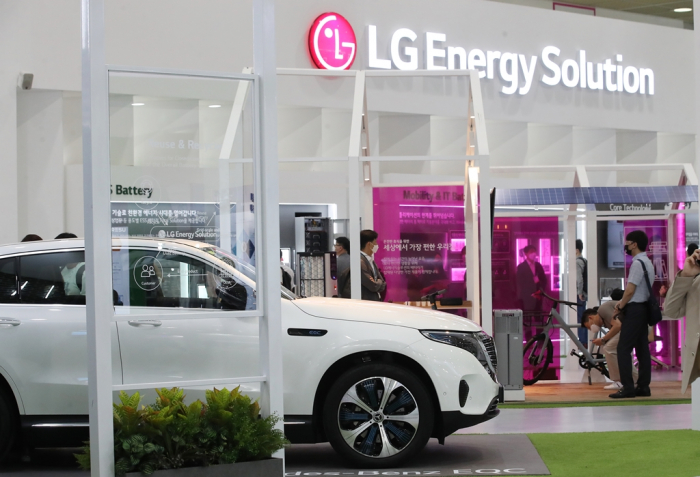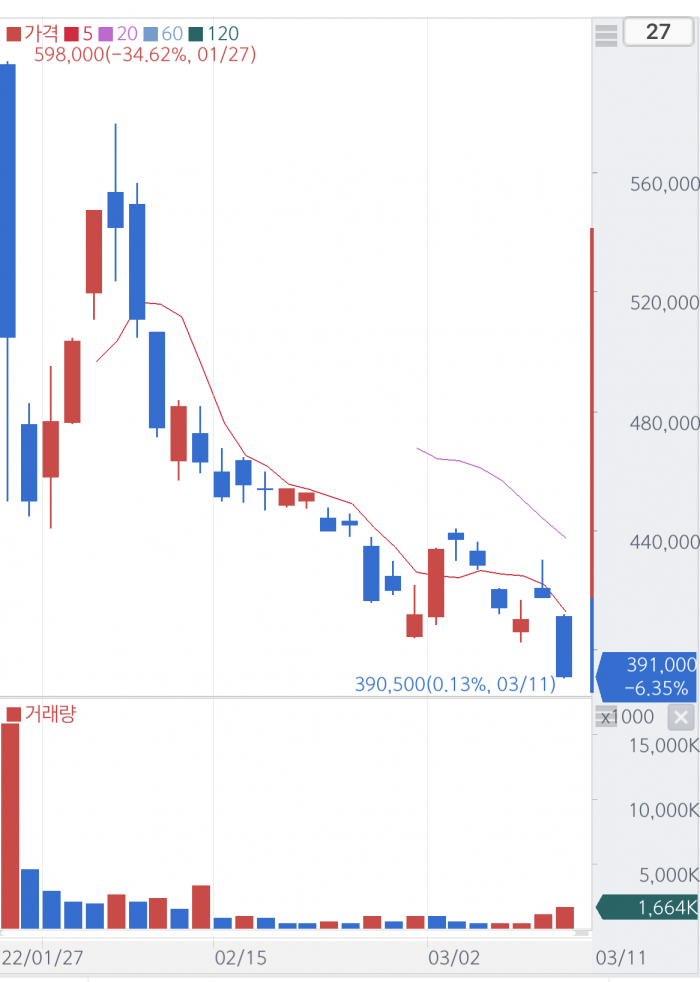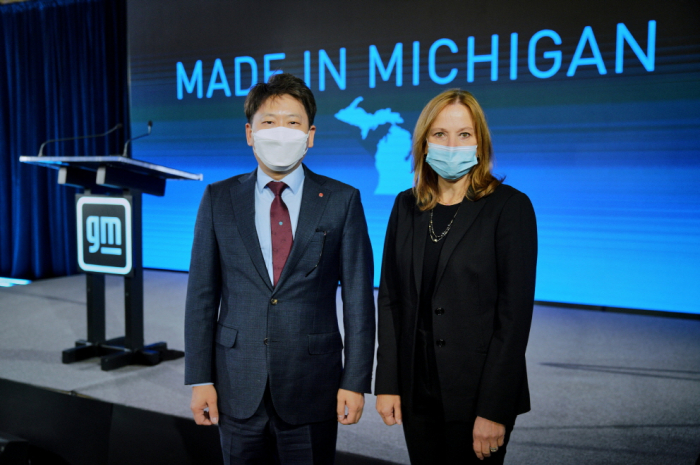Short selling
LG Energy shares at lowest since IPO on short-selling concerns
Despite steady share price, analysts keep their buy ratings with high target prices on LG’s strong presence in the US, Europe
By Mar 11, 2022 (Gmt+09:00)
3
Min read
Most Read
LG Chem to sell water filter business to Glenwood PE for $692 million


Kyobo Life poised to buy Japan’s SBI Group-owned savings bank


KT&G eyes overseas M&A after rejecting activist fund's offer


StockX in merger talks with Naver’s online reseller Kream


Mirae Asset to be named Korea Post’s core real estate fund operator



Shares of LG Energy Solution Ltd. on Friday fell to their lowest level since the top South Korean battery maker went public in January on market concerns that the stock could be the prime target for short selling.
The stock finished the day 6.4% lower at 391,000 won on Seoul’s main bourse, down 35% from its starting price of 597,000 won following its initial public offering on Jan. 27.
LG Energy, the world’s second-largest electric vehicle battery maker, made a stellar trading debut, ascending to rank the second-most valuable stock on the Kospi with its market capitalization of 118 trillion won ($98 billion), after the country’s top stock, Samsung Electronics Co.
However, LG Energy’s shares came under pressure soon after the IPO, posting a steady fall amid views that the stock might have been overvalued.
The stock’s significant fall on Friday was led by foreign investors and institutions, which sold the company’s shares worth 187 billion won and 94 billion won, respectively.

JOINING KOSPI 200 INDEX
Their heavy selling came as LG Energy’s stock joined the country’s major indices such as the Kospi 200 index and KRX-K New Deal BBIG index on the same day.
Becoming a member of the two major indices means that investors can start short-selling of the stock – a practice often used by big investors as a hedge against the downside risk of a certain stock.
“LG Energy’s shares are exposed to increased volatility now that they are subject to short selling despite higher chances of being purchased by passive funds,” said a local brokerage analyst.
On Friday, LG Energy’s transaction value totaled 677.8 billion won, of which 227.9 billion won, or 33.6%, was used for short selling, according to the Korea Exchange.
The stock is also weighed by the upcoming lifting of lockup periods for institutional investors, analysts said.
During the IPO, institutional investors promised not to sell their holdings of the stock for a minimum of three months, or up to six months. As many as 11.27 million LG Energy shares could be released from the lockup over the coming months.
Rising raw material prices in the wake of Russia’s invasion of Ukraine are also set to hurt LG Energy’s profitability.
Nickel and other raw materials, which account for around 60% of the cost to make electric vehicle batteries, have been steadily rising in recent weeks.
“Battery makers won’t be able to entirely pass on the rising raw material prices to clients. This is bad news for their earnings prospects,” said SK Securities analyst Yoon Hyuk-jin.

ANALYSTS RECOMMEND BUY
Despite LG Energy’s steady decline in its share price, however, most brokerage analysts maintain their buy ratings with high target prices.
According to market tracker FnGuide, the consensus for the battery maker’s share price was 529,182 won as of March 10, meaning upside potential of 35% from the current level.
“The company controls more than 40% of the EV battery market in Europe. It is also rapidly increasing its market share in the US, which will help LG Energy increase its sales and improve profitability going forward,” said Hana Financial Investment analyst Kim Hyun-soo.
Last month, LG Energy said it will spend $1.7 billion to expand its battery production capacity in Holland, a city in the US state of Michigan, by fivefold.
LG Energy Solution Michigan Inc., which began operations in 2012, has been supplying batteries to major US automakers, including General Motors Co., Ford Motor Co. and Chrysler.
Separately, LG Energy is running a battery joint venture, Ultium Cells LCC, with its partner GM in the US.
When LG’s own plant in Michigan and its JVs with GM and Stellantis are fully up and running, the Korean company’s total capacity in the US will reach more than 200 GWh, the largest among battery makers in the North American market.
Meanwhile, shares of LG Chem Ltd., the parent of LG Energy, also fell on Friday on concerns that the Russia-Ukraine war will significantly boost the price of naphtha, the feedstock for petrochemical products.
LG Chem finished Friday 4.9% lower at 472,000 won.
Write to Eun-Seo Koo at koo@hankyung.com
In-Soo Nam edited this article.
More to Read
-
 BatteriesLG Energy faces reality check as its stock turns a market laggard
BatteriesLG Energy faces reality check as its stock turns a market laggardFeb 25, 2022 (Gmt+09:00)
2 Min read -

-
 BatteriesLG Energy to spend $1.7 bn to hike Michigan battery capacity fivefold
BatteriesLG Energy to spend $1.7 bn to hike Michigan battery capacity fivefoldFeb 07, 2022 (Gmt+09:00)
3 Min read -
 BatteriesLG Energy: Will joining indices rescue stock from its plunge?
BatteriesLG Energy: Will joining indices rescue stock from its plunge?Jan 28, 2022 (Gmt+09:00)
3 Min read -
 IPOsOne in 10 Koreans rushes for LG Energy shares ahead of $8.6 billion IPO
IPOsOne in 10 Koreans rushes for LG Energy shares ahead of $8.6 billion IPOJan 19, 2022 (Gmt+09:00)
4 Min read
Comment 0
LOG IN


